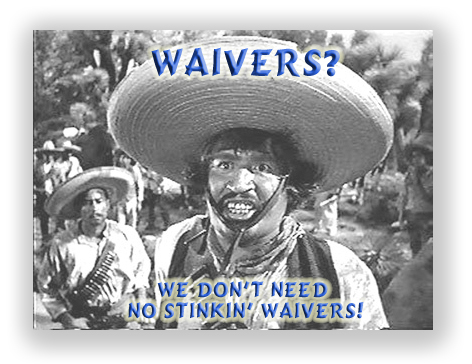We post news and comment on federal criminal justice issues, focused primarily on trial and post-conviction matters, legislative initiatives, and sentencing issues.

DODGING THE WAIVER
 A type of myopia common among federal defendants filing post-conviction § 2255 motions is understandable: people get so focused on their substantive issues – the prosecutor lied, the defense attorney slept, the judge was inept – that no one ever asks whether some arcane issue of procedure will defeat his or her claim before the merits are ever reached.
A type of myopia common among federal defendants filing post-conviction § 2255 motions is understandable: people get so focused on their substantive issues – the prosecutor lied, the defense attorney slept, the judge was inept – that no one ever asks whether some arcane issue of procedure will defeat his or her claim before the merits are ever reached.
One of the first procedural issues I usually worry about is the waiver. Face it, 97% of federal inmates plead guilty, and almost all of them sign some kind of plea agreement. And almost all plea agreements include a waiver section, in which a defendant waives the right to appeal or to collaterally attack (as in, file a § 2255 motion) the conviction or sentence. There is always an exception in the case of prosecutorial misconduct or ineffective assistance of counsel, but what happens when something like Johnson v. United States or Sessions v. Dimaya or United States v. Davis comes along?
Randall Cornette, convicted of a felon-in-possession charge, challenged his Armed Career Criminal Act sentence. The trial court had relied on some old Georgia burglaries that Randy said could no longer count under Johnson. The government replied that Randy had signed a plea agreement waiver that prevented him from raising a Johnson issue.
Last week, the 4th Circuit ruled that a plea agreement waiver does not prevent a defendant from taking advantage of Supreme Court decisions like Johnson or Davis. The appeals court ruled that an otherwise valid appeal waiver did not bar Randy from now arguing that by imposing a sentence under the unconstitutional residual clause of the ACCA, the district court exceeded its statutory authority to sentence him.
The Court said that an appeal waiver does not preclude a defendant from challenging a sentence “based on a constitutionally impermissible factor” or “a sentence imposed in excess of the maximum penalty provided by statute.” Randy’s sentence challenge is based on the assertion that the district court did not have the statutory authority to impose the sentence under to the residual clause. Because Johnson was made retroactive by the Supreme Court, the Circuit said, “all sentences rendered under the residual clause became unconstitutional. Therefore, Randy’s sentence was imposed in excess of the maximum penalty provided by ACCA.”
The 4th said that this doesn’t mean that a non-retroactive change in the law, like Booker or Alleyne, can be challenged where there is a collateral-attack waiver. But where a Supreme Court case (like Davis, for instance) “announces a substantive rule that applies retroactively, the district court is now deemed to have had no statutory authority to impose [a] sentence,” and a court may review a sentencing challenge “notwithstanding the appeal waiver.”
United States v. Cornette, 2019 U.S. App. LEXIS 22554 (4th Cir. July 30, 2019)
– Thomas L. Root

